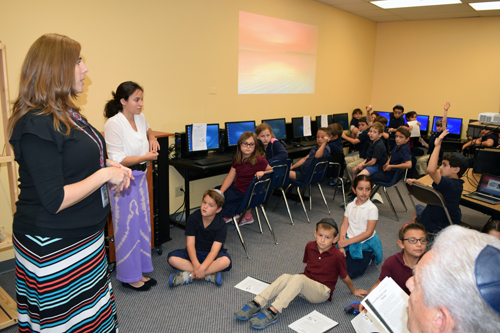
By Donald H. Harrison

SAN DIEGO – What grandparent, after an absence of any significant duration, hasn’t looked at his or her grandchild, and said wonderingly, “My how big you’ve become!”
Rabbi Simcha Weiser, headmaster of the Soille San Diego Hebrew Day School, told an assemblage of grandparents on Wednesday, October 21, that the first time God spoke to the biblical patriarch Abram, God said “Lech Lecha” – Get thee out. But in telling Abram to “go” to a land He would show him, God was also telling him to “grow,” and to become a greater person than before.
At the Hebrew Day School, the headmaster said, much of the focus is on helping younger students to grow, not only in the sense of growing physically and being strong, but also in living nicely with one another. To succeed today, Weiser added, children need to understand the concepts of cooperation, and being part of a team. Later, when they get into higher grades, he added, they will be better positioned for reflection and analysis.
And with those thoughts, Nancy and I marched off to the school’s library and computer center where two classes of third graders were assembled at their computer screens.
Their lesson for the day, co-taught by teachers Carrie Lane and Rachel Guenniche, was “Losing Can Be Winning” from the work book Shalom Secrets. The children took turns reading sections of the lesson, and then choosing –“or popcorning,” as teacher Lane described it – the reading to another child in the class, back and forth, across the room.
When two people can’t come to an agreement, the lesson suggested, there is a “special mitzvah in the Torah telling us to agree to give in.” When people purchase something at a store, they don’t “lose” the money they spent; they receive something in return. So imagine there is to be a chess game, but only two of three children present can play. One child needs to let the other two play. In such matters, people who give in aren’t losing; they are gaining in the knowledge that they “made shalom when there was a fight.” One of the mitzvoth that earns people merit in this world and the next, according to the lesson, is “making peace between two people.”
Giving in also is an example of the mitzvah of doing an act of kindness, “since you did your friends a favor by allowing them to get what they wanted.” Furthermore, by allowing your two friends to play ahead of you, you have avoided arguments, bad feelings, wasted time, and “who knows? Since you gave in this time, there’s a good chance that next time you have a conflict with one of these friends, he or she might decide to be the one to give in.”
After completing the reading, the students turned on their computers for a multiple choice test. Eleven questions, based on the readings, were presented, and the pupils could press a panel with any of four colors keyed to answers which the teacher read. If they answered correctly, their screens would turn green; incorrectly and the screens turned red. The results were posted on a larger screen in the front of the class room, with the nicknames of the five students answering the most questions correctly posted on the main screen.
You would have thought the Hebrew Day School “Huskies” – as their sports teams are called – scored touchdown after touchdown as great cheers erupted every time screens turned green. Learning—and perhaps having the students of two classes and grandparents in the room – seemed to add exponentially to the energy level, question after question, until the quiz was completed.
Nancy and I left the school with a common thought. Learning is a lot more fun today with computers and contests. But the lessons teaching good behavior, cooperation, and derech eretz, over generations have been tested and proven.
*
Harrison is editor of San Diego Jewish World. He may be contacted via donald.harrison@sdjewishworld.com